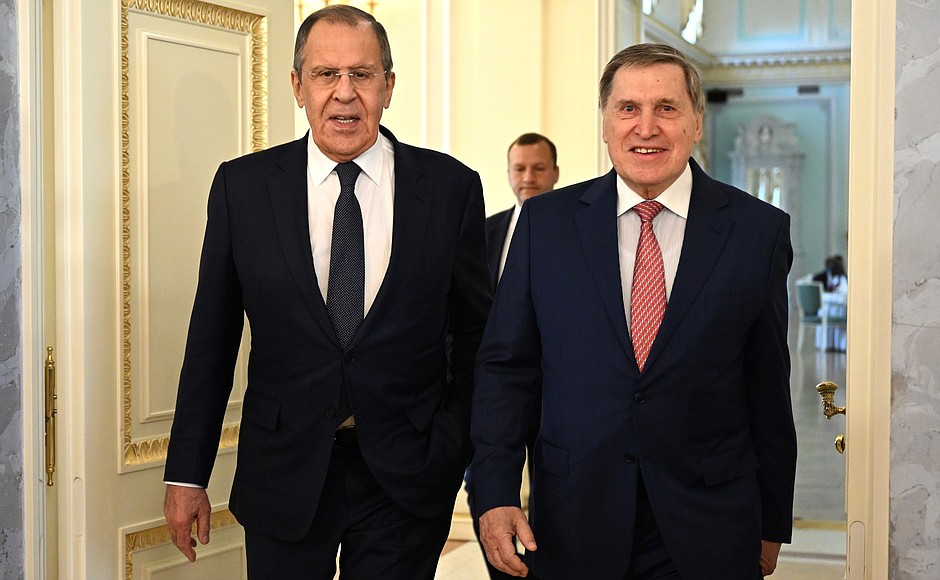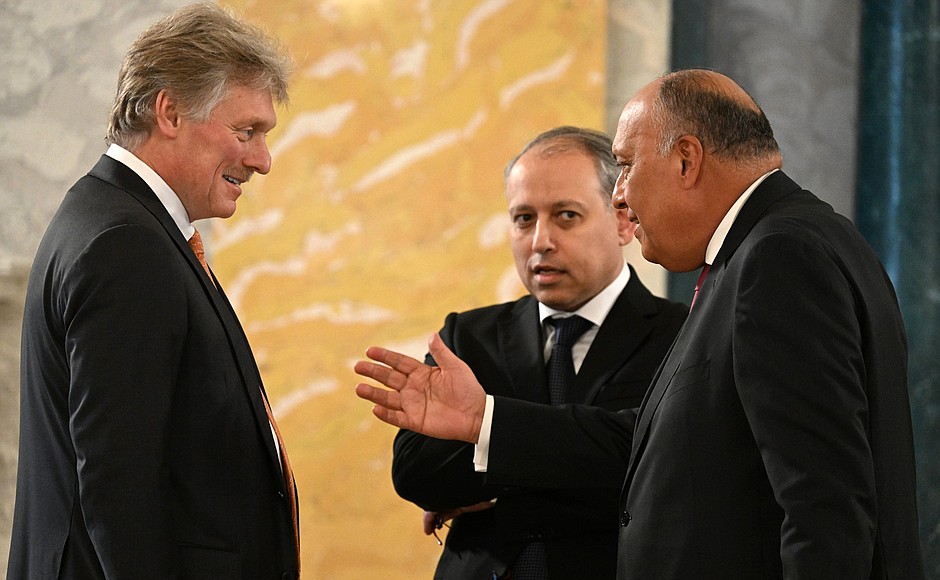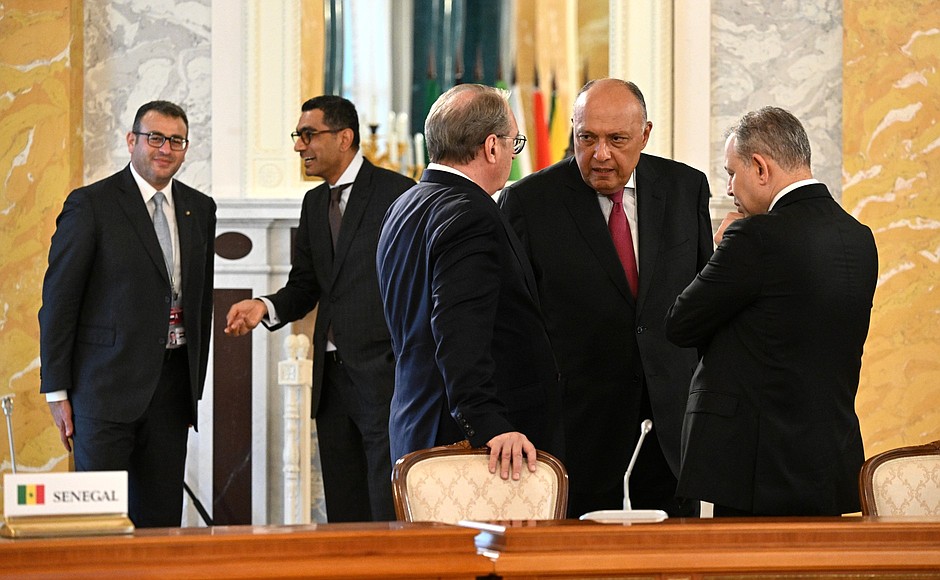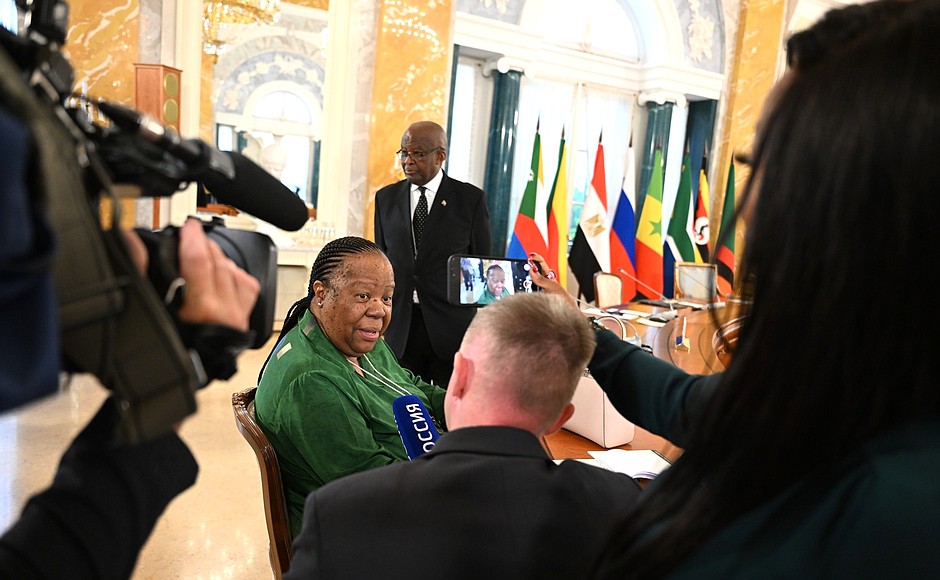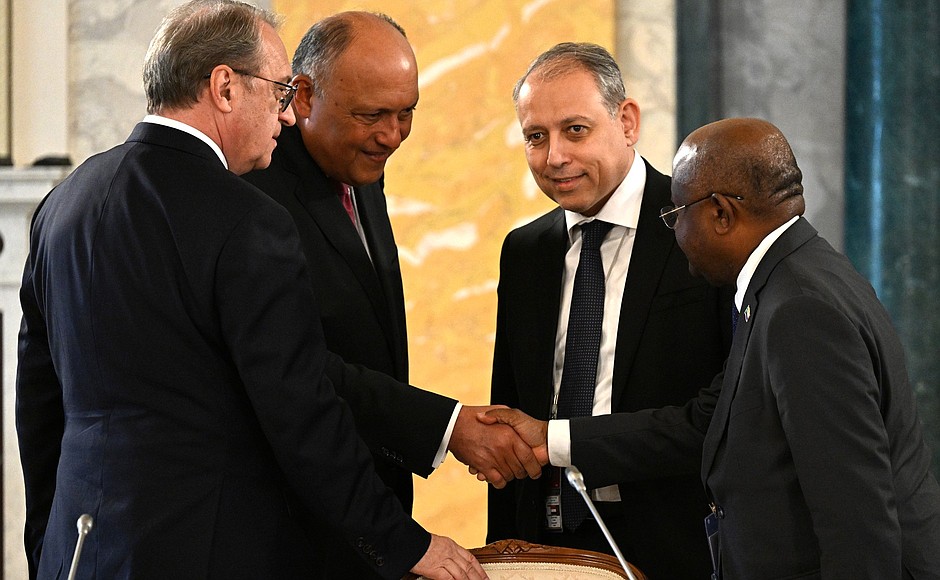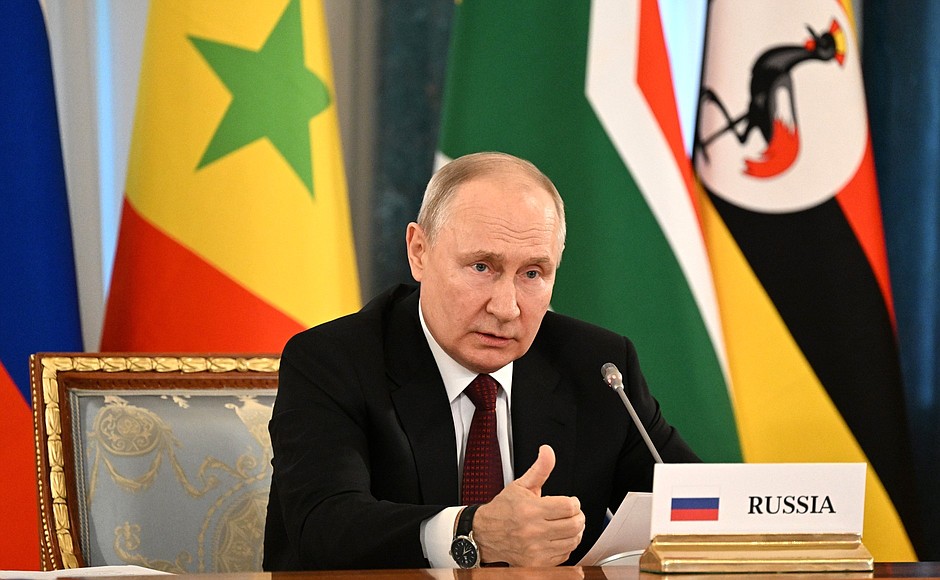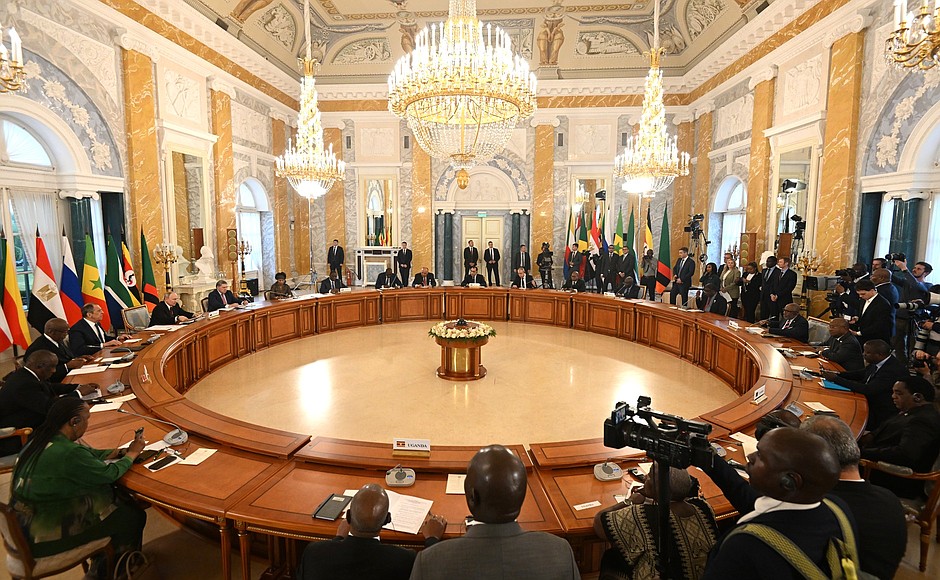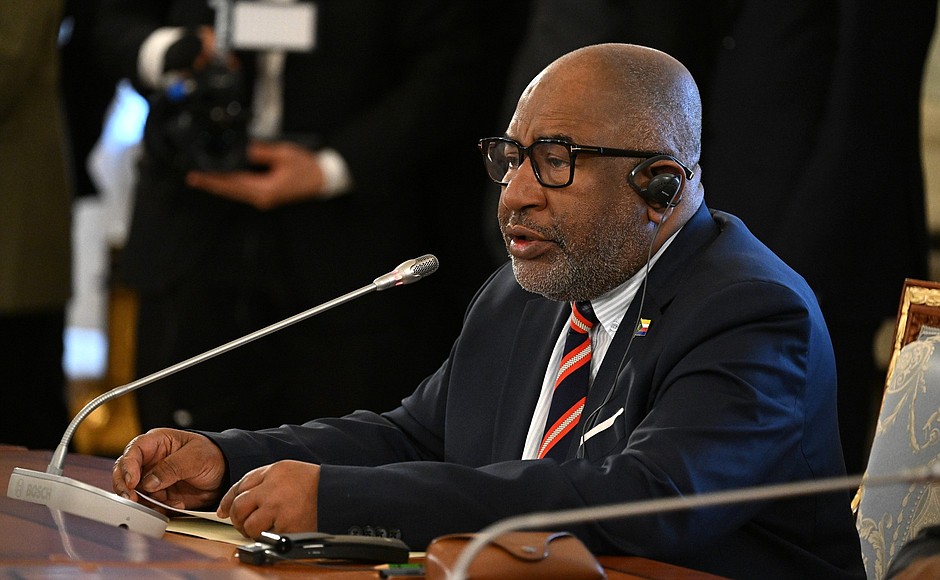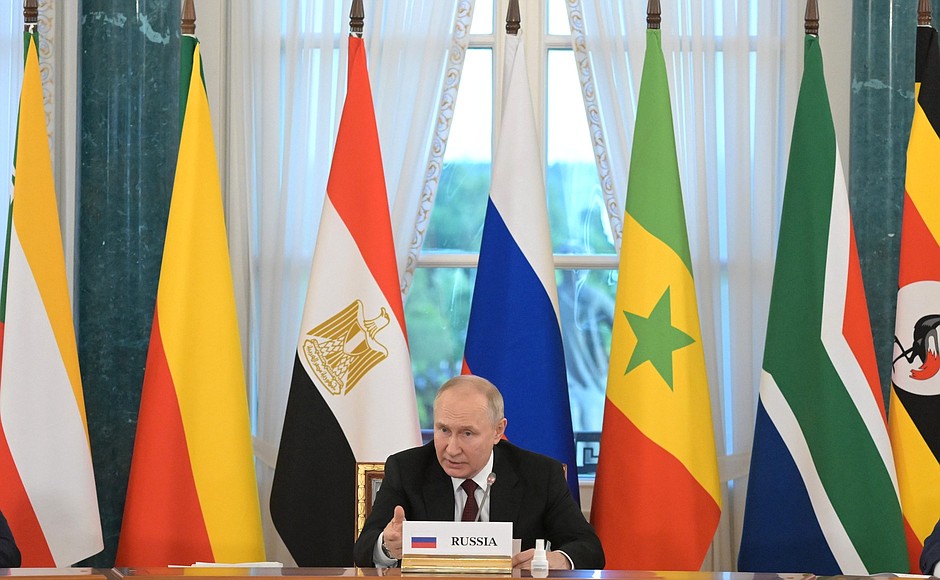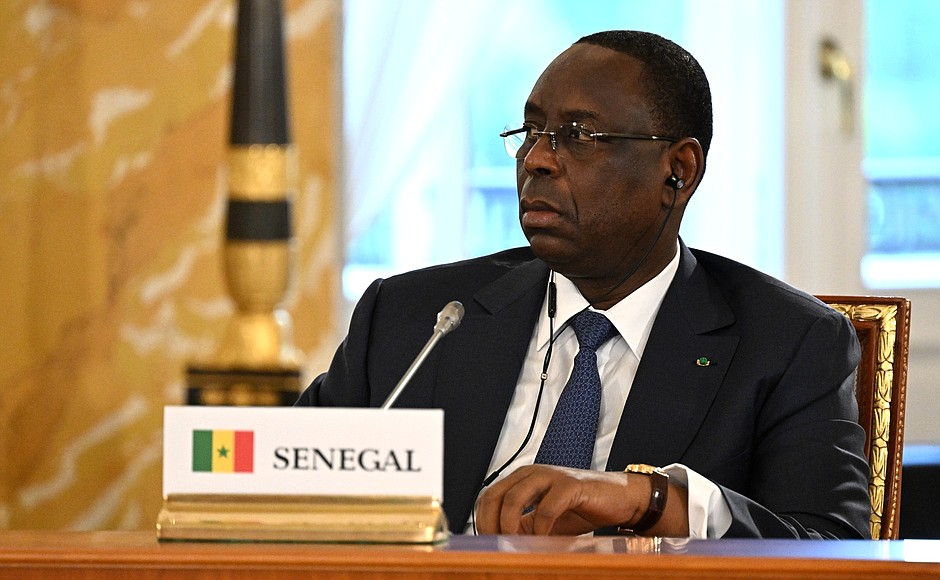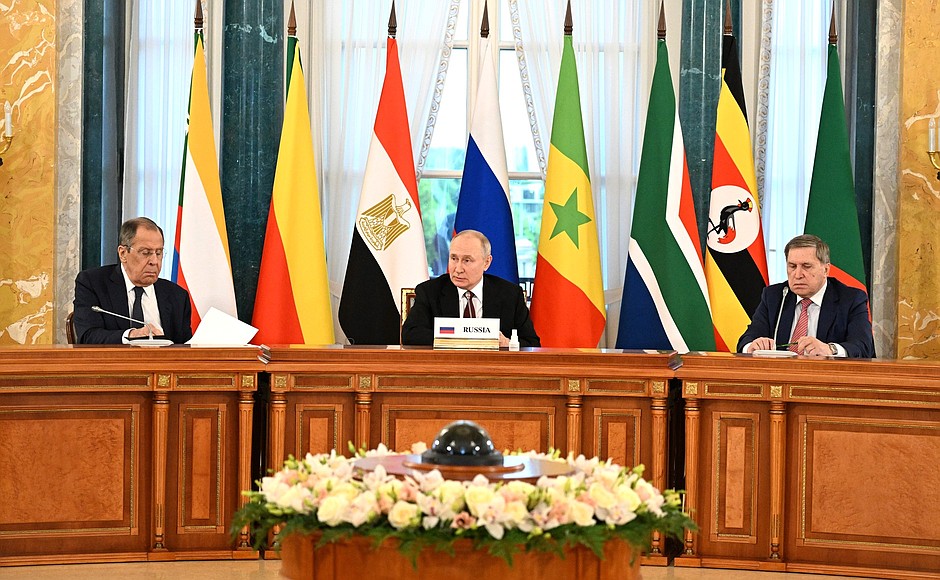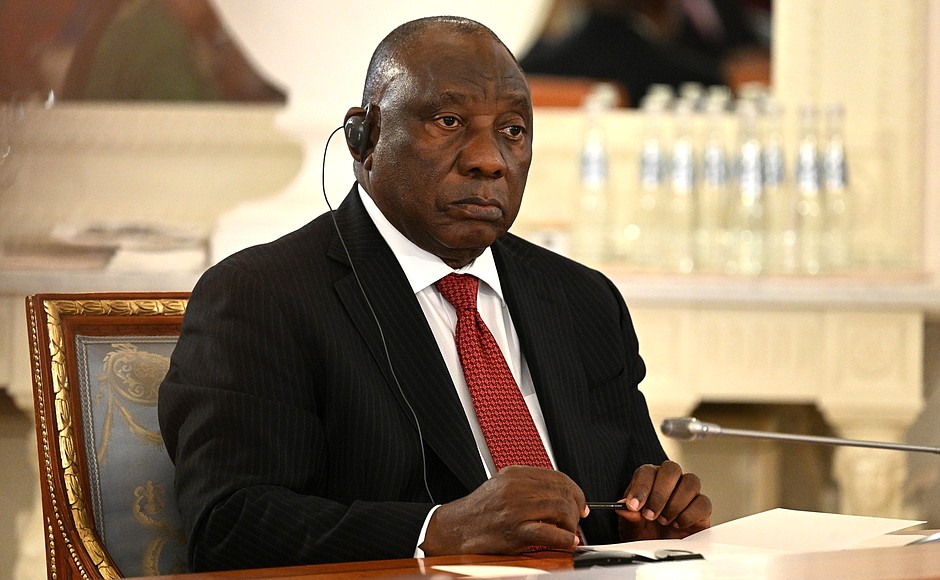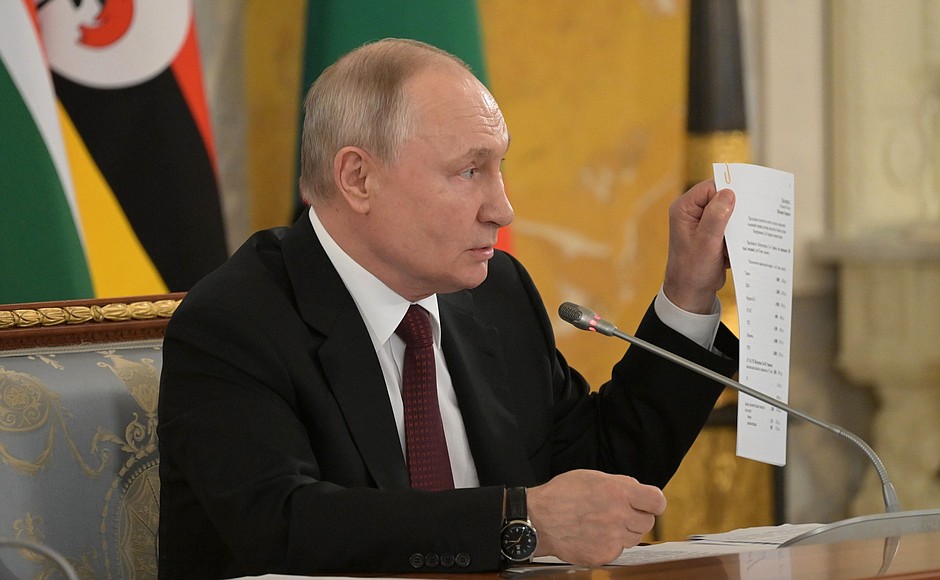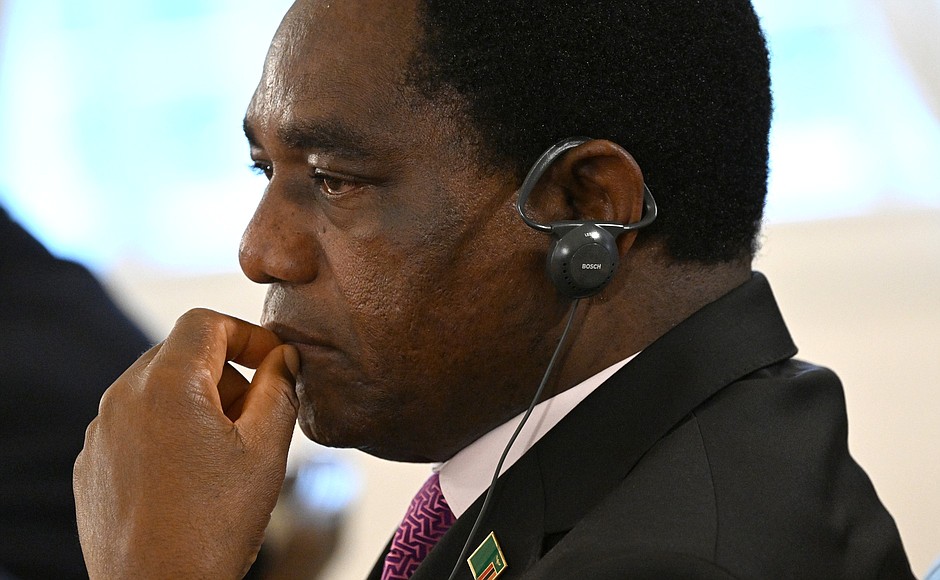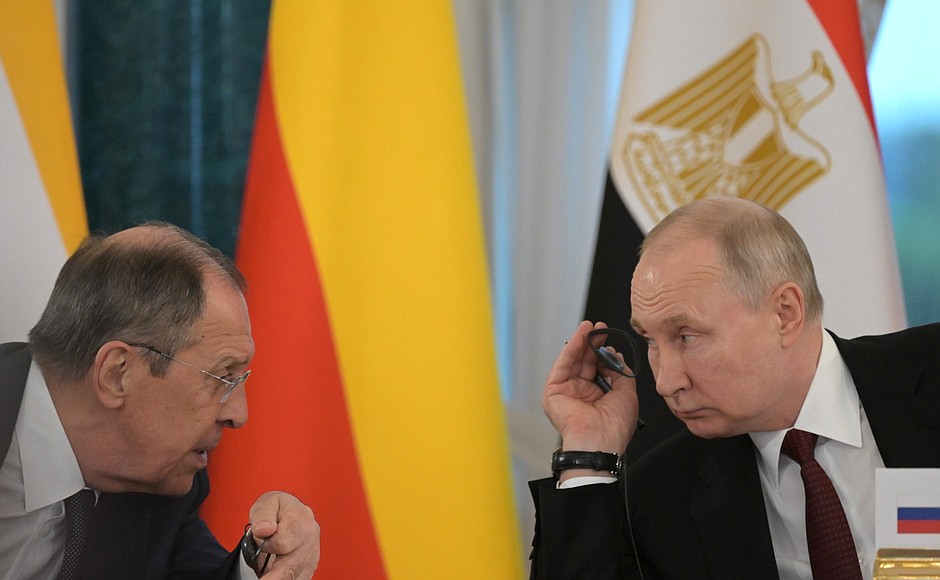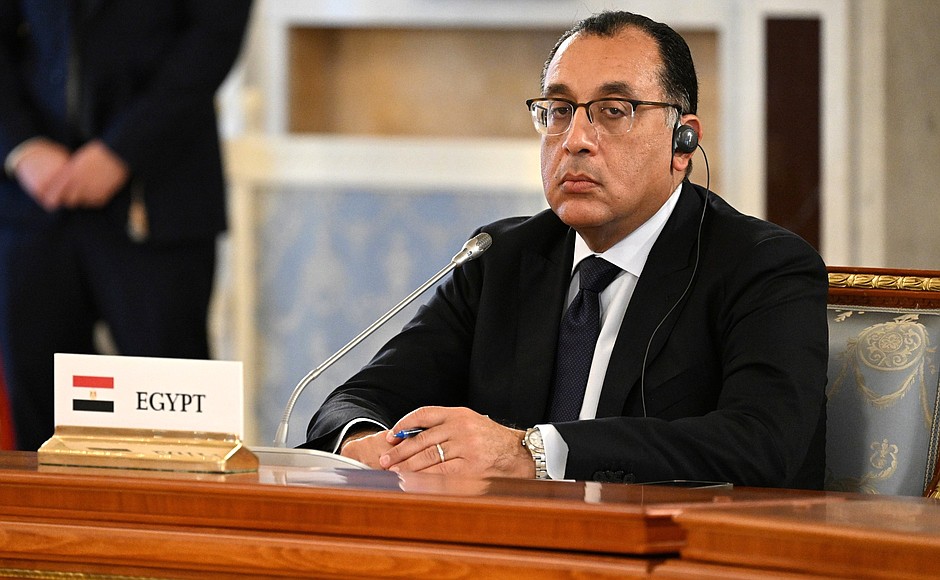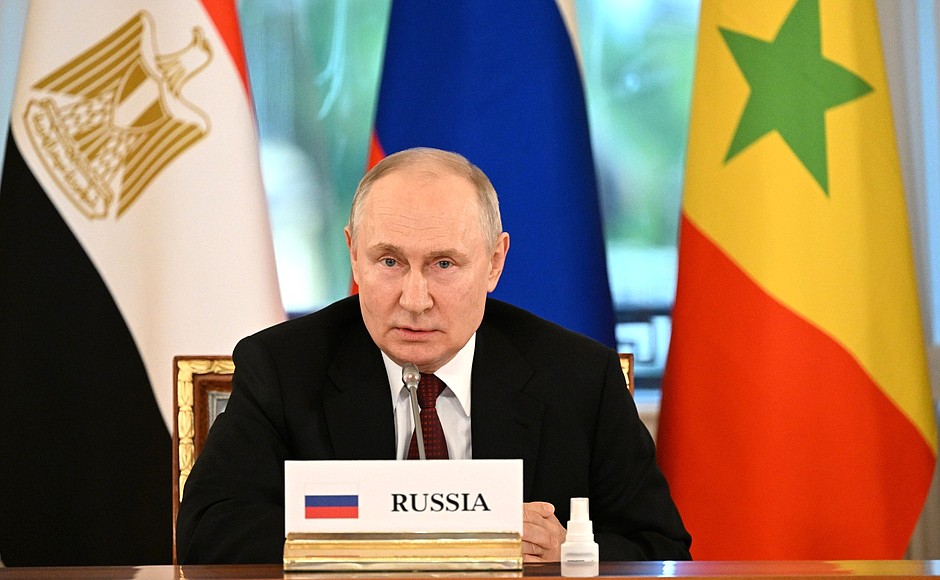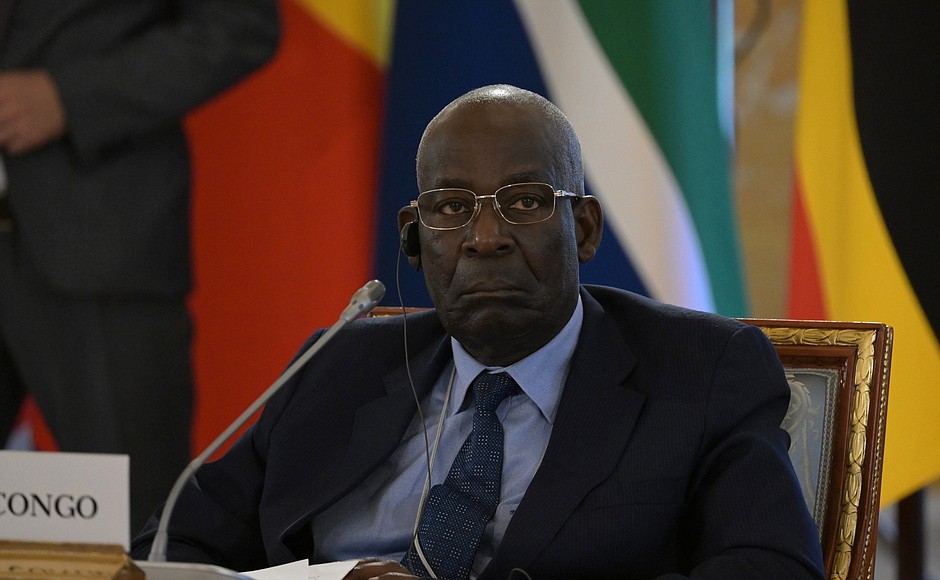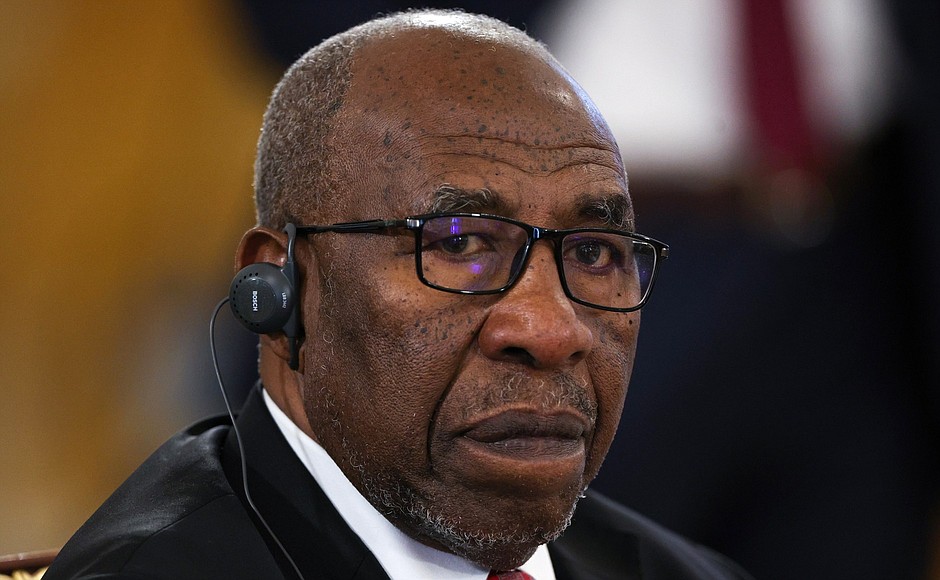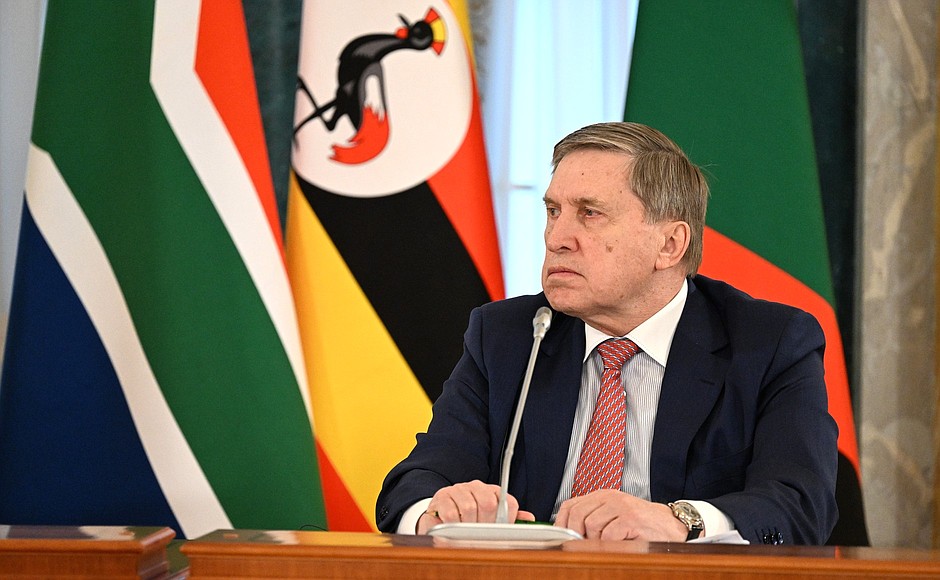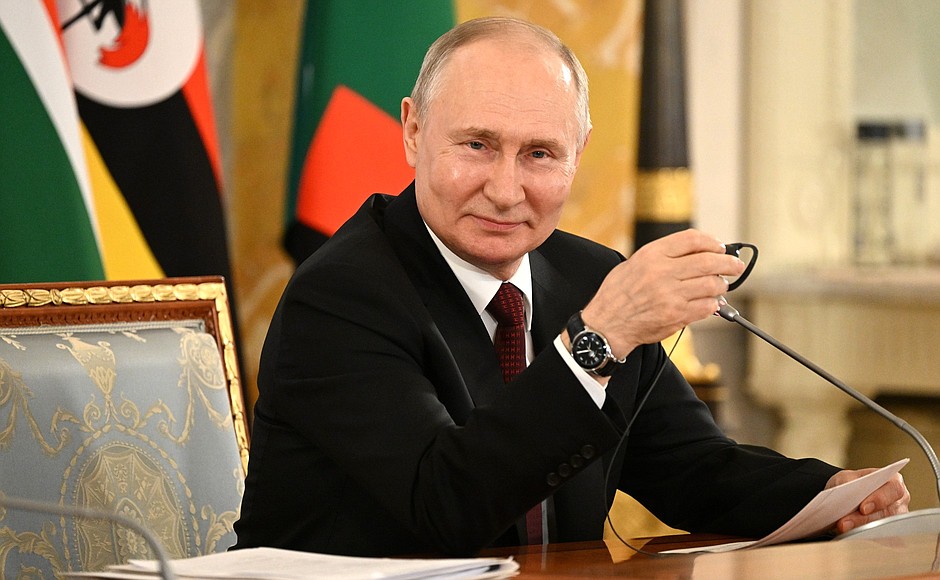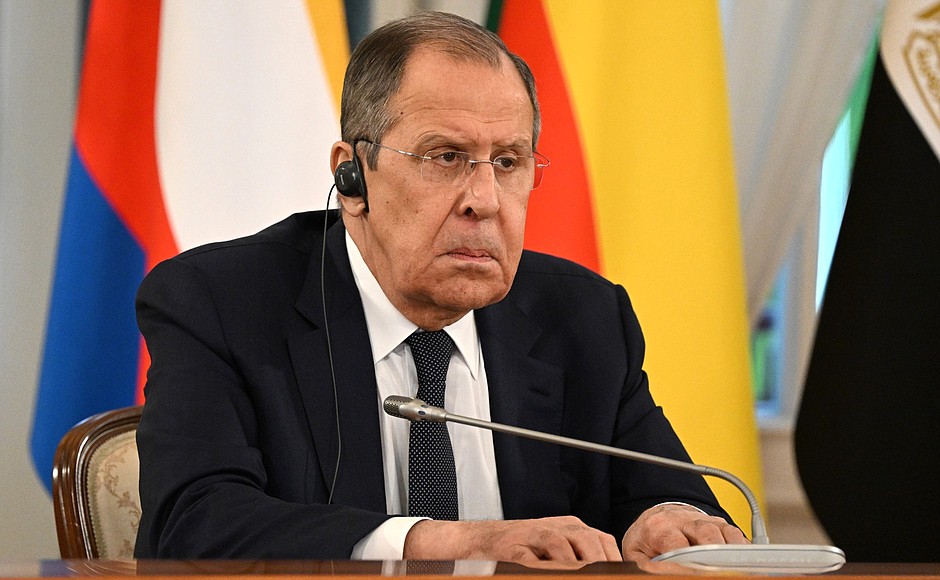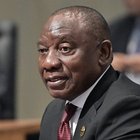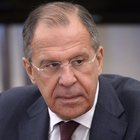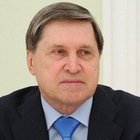As previously agreed, representatives of seven African countries arrived in St Petersburg to hold talks on possible ways to resolve the situation around Ukraine.
The delegation included President of Zambia Hakainde Hichilema, Chairperson of the African Union and President of the Comoros Azali Assoumani, President of the Republic of Senegal Macky Sall, President of the South Africa Republic Cyril Ramaphosa, Prime Minister of the Arab Republic of Egypt Mostafa Mabdouli, Minister of State and Director of the Cabinet of the President of the Republic of the Congo Florent Ntsiba, and Special Envoy of the President of Uganda for Special Duties Ruhakana Rugunda.
On the Russian side, the meeting was attended by Minister of Foreign Affairs Sergei Lavrov and Presidential Aide Yury Ushakov.
Following the official part of the talks, the parties continued communicating in an informal setting: Vladimir Putin and heads of the African delegations took a walk around Peterhof, a complex consisting of a set of palaces and gardens on the coast of Gulf of Finland.
* * *
President of Russia Vladimir Putin: Chairperson of the African Union, President of the Comoros Azali Assoumani,
President of the Republic of Senegal, Mr Macky Sall, President of the South Africa Republic, Mr Cyril Ramaphosa, President of the Republic of Zambia, Mr Hakainde Hichilema, Prime Minister of the Arab Republic of Egypt Mostafa Mabdouli,
Representatives of the Republic of the Congo and Uganda,
Friends,
I am genuinely happy to welcome all of you in St Petersburg.
Comprehensive development of ties with African countries is a priority of Russian foreign policy. We have consistently stood for further consolidating the traditionally friendly relations with African countries and the primary regional association – the African Union – based on principles of equality, mutual respect and non-interference in internal affairs.
This year our cooperation with our African partners has been actively developing in the broadest possible range of directions. Comprehensive preparations are underway for a milestone event – the second Russia-Africa summit to be held soon here, in St Petersburg. I am confident that promising new directions of cooperation in political relations, trade and economic ties, science and technology, humanitarian affairs and other fields will be outlined during this event.
I would like to underscore that Russia has the utmost respect for the principled position of African states in favour of maintaining global and regional stability and security, peaceful settlement of conflicts, and establishing a more just model of international relations.
We support your aspiration to pursue independent, sovereign and peaceful policies. We welcome the balanced approach of our African friends towards the Ukrainian crisis.
Friends, we appreciate your interest in seeking ways to resolve the conflict. We immediately accepted your proposal to hold talks regarding the situation around Ukraine.
I know that you have specific ideas and proposals in this context. I have discussed this issue with the President of the South Africa Republic a number of times. I am thankful to him for raising the issue.
Let me stress once again that we are open to constructive dialogue with everyone who wants peace to be achieved based on the principles of justice and consideration of the legitimate interests of the parties.
And now I would like to give the floor to the Chairperson of the African Union, President of the Comoros Azali Assoumani.
And after that we, as we just agreed before entering the hall, will listen to the views of all members of your representative delegation, in alphabetic order, just as we agreed.
Thank you very much.
Chairperson of the African Union, President of the Comoros Azali Assoumani (retranslated): Thank you very much.
Your Excellency, Mr Vladimir Putin, a great friend of Africa, Mr President of the Russian Federation,
Colleagues, Your Excellencies, heads of state and government of the African mission,
Ministers, ladies and gentlemen,
First of all, I would like to thank His Excellency President Putin and the Russian people for the warm welcome we are enjoying here, in St Petersburg, this large, legendary, beautiful city.
I would also like to thank you for finding the time to receive us. Thank you for believing in our delegation’s desire to make its contribution to finding sustainable peace in the crisis that puts Russia in opposition to Ukraine and that has been going on for quite a long time now.
Your Excellency, Mr President, ladies and gentlemen,
I am the Chairperson of the African Union. I assumed this office in February. I also assumed the responsibility to carry on the mission of the African Union: to contribute to promoting peace and stability not only on the African continent, but across the world.
Mr President, friends, as you know, wars have always had dire consequences, and the longer they last, the deeper and more unprecedented their consequences are. We will not teach you anything new about this, because your country has experienced many painful events in the past.
This crisis exists today, and it does not only affect two friendly and neighbouring Slavic countries, but also affects the entire world. In particular, it affects our African continent. It has caused unprecedented problems in the sphere of food security and energy security.
So, we have decided to travel to your country at this moment as a delegation representing the African continent, thus showing our friendship that has always united Russia and Africa. We have also come to listen to you and, through you, to the opinion of the Russian people. We also want to encourage you to begin talks with Ukraine in order to put an end to this ordeal.
We have embarked on this mission because unfortunately, as Africans, we have witnessed many conflicts. And we can resolve these issues only through dialogue and talks. We would like to share our experience with you to find a positive outcome, a positive way out of this crisis. Our brother President Ramaphosa made a proposal hoping he will be able to convince the two countries, Russia and Ukraine, to opt for dialogue.
As you know, we went to Ukraine yesterday to meet with President Zelensky and to listen to him, to make our proposals about finding a solution to this conflict.
Mr President, Your Excellencies, ladies and gentlemen,
Let me stress that Africa’s mediation efforts will be mediation in the name of peace. We would like to remind you that in a globalised world that we live in, if a country or a region is affected by a crisis – regardless of its nature, and we know a lot about this – the whole community of countries faces a threat. This is why we must make every effort to prevent such crises.
This is the heart of the message which we wanted to deliver to you, Your Excellency, and to the Russian people. Peace between your two fraternal peoples remains the key element of stability in your region and in the whole world in general, as well as for Africa, taking into account the excellent relations that we have always enjoyed with Russia.
We, the heads of African states, representatives of the African continent, hope that you will opt for a peaceful settlement. We are ready to support you, ready to support two friendly countries in the efforts which you will make in this regard.
Thank you for your attention.
Vladimir Putin: Thank you very much for your words, dear friend.
We will have a full-fledged discussion, and then I will take the opportunity to express my position, and we will exchange opinions, including on the results of your yesterday’s trip.
And now I would like to give the floor to the President of the Republic of Senegal Macky Sall.
President of Senegal Macky Sall (retranslated): Thank you, Mr President Vladimir Putin.
Your Excellency, dear Vladimir, first of all, I would like to thank you for the gracious reception given to us, as well as for finding time in your schedule to meet with us.
You have always been attentive to Africa and have always listened to us whenever we spoke to you about our concerns. This demonstrates the good level of relations between Russia and Africa. These relations have become even better since the first summit. Soon we will hold the second Russia-Africa summit here in St Petersburg; it will happen in July.
Mr President, I would like to take this opportunity to thank you once again for hosting us in such a friendly atmosphere.
Thank you for hosting us on June 3, 2022, as well. At that time, I came to Russia as Chairperson of the African Union, and back then, I conveyed to you a message of peace and de-escalation. We were particularly concerned about the problem of food and fertiliser supplies from Russia and Ukraine. You listened carefully to us and showed that you were ready to support us in unblocking this conflict. Thanks to you and other parties, such as Turkiye and the UN, we reached an agreement – the grain deal.
We are meeting with you again today, Mr President, as part of our new mediation mission. The Chairperson of the African Union has already spoken about this mission. We are mediators in the conflict between Russia and Ukraine.
I would like to emphasise that this initiative is a good offices mission, which is here to convey the good intentions of the African continent in this large-scale, major war. We want to resolve the humanitarian problems and create conditions that will help to restore trust and dialogue between the parties to this conflict.
Yesterday we visited Kiev, where we conveyed this message, spoke about our good offices and also listened to President Zelensky. I noted that dialogue was still an option, it was not out of the question, although certain conditions were mentioned, including compliance with the UN Charter. I am confident that Russia, which is a founder of the United Nations and a permanent member of the UN Security Council, also complies with that Charter. And today we will have the opportunity to discuss certain issues, which my colleague from South Africa [Cyril Ramaphosa] will talk about.
Mr President, we insist that, despite the situation on the ground, in military terms, it is nevertheless important to maintain channels for dialogue, for discussion, so that at least humanitarian issues become our priority and so that all other aspects of reconciliation can be discussed. It seems to me that humanitarian efforts should be intensified, in particular in regard to POW exchanges and issues affecting civilians. I think we can have a detailed discussion of these issues.
I would like to welcome Russia's release of Ukrainian prisoners of war on June 9. I believe that this was a very good decision on the way to reaching an agreement on the release of prisoners of war.
Mr President, we have come to listen to you, too, and tell you that Africa wants peace between Russia and Ukraine. We are confident that peace is possible through dialogue and compromise.
Thank you for your attention. Thank you.
Vladimir Putin: Thank you very much.
President of the Republic of South Africa Cyril Ramaphosa, please.
President of the Republic of South Africa Cyril Ramaphosa: Thank you very much. I want to extend greetings to you, President Putin, President of the Russian Federation, and indeed, also to extend my greetings once again to my fellow heads of state as well as our other colleagues who are heads of government and envoys of the presidents who cannot be here.
Let me say that we would like to thank you for agreeing to meet us. We are a seven African nations peace initiative, and we are essentially on a peace mission to try and promote peace between Russia and Ukraine in this conflict.
We have some ten points that we would like to raise. Our proposal really revolves around ten elements. The first, of course, is that we want to listen. We are here to listen, as we did listen yesterday to President Zelensky. He outlined a number of issues to us, and we did tell him that we would be meeting you, where we would also listen to your perspective on this war. We want to listen with respect and also with recognition of the views that you will put forward to us. But we also recognise the many other proposals that have been put forward by a number of key players in the world, who have put forward peace proposals. Our proposals are not in competition with the other proposals that have been put forward.
The second point that we would like to raise, a key element of our broad proposals, is that we do firmly believe that this war must be settled, and it must be settled through negotiations and through diplomatic means. The war cannot go on forever. All wars have to be settled and come to an end at some stage. And we are here to communicate a very clear message that we would like this war to be ended. We say so because this war is having a negative impact on the African continent and indeed on many other countries around the world. As a continent we are being negatively affected in terms of our economies, the prices of commodities have gone up, particularly grain and fertilizer. The prices of fuel have also gone up. And this is a consequence of the war that is ongoing. It is for this reason that we are also here: it is in our collective interest that the war should come to an end.
The third point we would like to put forward is that we would like to see a de-escalation of the conflict. The escalation of the conflict on both sides does not enhance the peace process. So we would like to see the conflict being de-escalated as we find a way to peace.
The fourth point, which has also been covered in a number of other proposals, is that we recognise the sovereignty of countries in terms of the UN Charter. And yes, in terms of that Charter, we believe that all of us should work in terms of internationally recognised principles, and it is for that reason that we would like to submit that we recognise the sovereignty of countries in terms of that Charter.
The fifth point we would like to raise is that there needs to be a guarantee of security for all countries. This matter has been raised on all sides, that all sides want some guarantees, and we agree with that.
The sixth point that we would like to raise is what is affecting our countries, and we would like to call for the opening up of the movement of grains across the Black Sea, so that whatever blockages there are, they should be opened up, and grains and commodities must be opened to the markets.
The seventh point we would like to put forward is that we should ensure that there is humanitarian support for those who are in need and for those who are suffering as a result of this conflict.
The eighth point has also been raised by President Macky Sall with regard to the release of prisoners of war on both sides. The other issue that is related to this is the children who have been caught up in this conflict. They should also be returned to where they have come from, to their homes.
The ninth point for us is that as every war leads to destruction, there should be post-war reconstruction, and we should support the reconstruction that needs to take place beyond this war.
The tenth point, President Putin, is that we would like to see further engagements with regard to the processes that will lead to the end of this war. We articulated this point specifically with President Zelensky, and he agreed that yes, as the African continent and as African countries that are here, we can play a role. So we would like to urge that beyond this engagement today, there should be further engagements, because ending wars does tend to take a number of meetings and engagements. And as the African continent, represented by the seven countries that are here, we do believe that there is a contribution we can make. And we make this contribution with the greatest respect for both countries, respecting the positions that they have put forward, but also believing that there is a common position that can emerge, a position that can lead to peace.
A number of proposals that have been put forward we believe lay the foundation for peace to be found, and this is precisely what we would like to explore, so that all of us together can contribute to bringing this war to an end.
Those, President Putin, are the key elements of our proposals that we put forward to President Zelensky, and which we also now put forward to you. We do believe that this is the time for both parties to negotiate. To negotiate an end to this war because this war is causing a great deal of instability and harm to various countries around the world, and we, as African countries, are feeling the impact of this war.
This is what we have come here to share with you, and I would like to end by saying that this is a historic mission. The African continent, represented here through seven countries, has never really been involved in a mission of this sort. So we would like to say that we have taken this step believing that yes, we can contribute. We would like to thank you for giving us the time to listen to what we have got to say, but, more importantly, we want to listen to you as well. Thank you very much for welcoming us.
Vladimir Putin: Mr President, friends,
As we agreed, I will now, with pleasure and interest, give the floor to the head of each delegation. But, after the remarks of three of our esteemed guests, let me say a few words about why we have gathered here and what we are discussing today.
First. You are well aware, I am confident about this, that all the problems in Ukraine were conceived after a state unconstitutional armed and bloody coup in Ukraine in 2014. This coup was supported by Western sponsors. As a matter of fact, they have been pretty much open about this. They even specified the amount they spent on the preparations for and execution of the coup. And this coup is the source of power of the current leaders in Kiev. That is the first thing.
Second, after the coup, part of Ukraine’s population did not support it and declared that the population of those areas would not submit to the people who came to power following the event. Russia was forced to support these people, bearing in mind our historical ties with the areas, and the cultural-language bonds with the people living in those areas.
For a long time, we tried to restore the situation in Ukraine via peaceful means. If you have heard, you must have heard something about this, corresponding agreements were signed between the opposing parties in the capital of Belarus – Minsk. In this way, the so-called Minsk settlement process was launched.
As it turned out, the western countries and the Kiev government authorities were simply leading us by the nose, then they declared practically publicly that they would not adhere to our peaceful agreements and they actually withdrew from that peaceful process.
It was after this, friends, that Russia was forced to recognise the independent states that had been formed in Ukraine, which we had not been recognising for eight years: the Lugansk People’s Republic and the Donetsk People’s Republic.
Now I am moving to the international-legal aspect of this case. Question: did we have the right to recognise the independence of these areas? We did, in full compliance with the UN Charter, because pursuant to the corresponding articles of the UN Charter these areas had the right to declare their independence. This gave us the right to recognise them and we did.
Then, after signing the Treaty on Friendship and Cooperation [and Mutual Assistance], we had the right to render assistance to them in full compliance with the UN Charter. Because the Kiev regime made numerous attempts to resolve the issue using arms and, in fact, launched military actions in 2014 using aviation, tanks and artillery against civilians. It was the Kiev regime that sparked this war in 2014. And in accordance with Article 51 of the UN Charter we had the right to render assistance to them citing the self-defence clause.
This is why, colleagues, the logic which I have just set forth, is irreproachable in terms of the international law and the UN Charter, both in my opinion and in the opinion of my colleagues and experts. This is the first thing.
The second matter, which worries all of us, is undoubtedly connected with the global economy, food and everything that is involved with it, inflation and so forth.
I would like to emphasise that the crisis on the international food market was not caused by Russia’s special military operation in Ukraine. It began to develop long before the situation in Ukraine and emerged because the western countries – both the United States and the European countries – began printing money in a way that was unjustified, not justified economically, to deal with their problems caused by the COVID-19 pandemic.
And by printing this huge amount of money – in the United States, I think it amounted to around nine trillion US dollars and about five trillion euros in Europe – they sucked up all the commodity goods in the world market, to their benefit, just like a vacuum cleaner, abusing their monopolistic position and putting developing countries at a disadvantage. I will not go into details but this is, as we say, a medical fact, an obvious thing.
Now, I would like to move onto the grain deal. Yes, we surely understand that no matter what, despite any issues connected with the conflict in Ukraine and the conflict between Russia and Ukraine, the developing countries, including the African countries, which need food, must not suffer.
We do not believe that supplies of the Ukrainian grain to the global markets resolve issues of poverty and hunger. No, this is not so. Nevertheless, we conceded to proposals of UN Secretary-General Antonio Guterres and did everything possible to, just as he said then, ensure supplies of Ukrainian grain to, first and foremost, the poorest African countries. We agreed to that.
What is the result, ladies and gentlemen? Let me cite the figures. Figures are dry and impartial.
As of June 15, 31.7 million tonnes of agricultural products were exported from Ukrainian ports with our assistance and the assistance of Turkiye – President Erdogan put a lot of effort into this; 31.7 million tonnes – quite a figure.
Only 976,000 tonnes out of 31.7 million were shipped to Africa’s needy countries, that is Djibouti, Somalia, Sudan, Libya, Ethiopia. This is only 3.1 percent, ladies and gentlemen, friends. These European neo-colonial powers, technically the US, have once again deceived the international community and the African countries in need: 31.7 million tonnes were exported and only three percent reached Africa’s needy countries.
Is this not deception? They got used to lying to the entire world for centuries and they continue to do it today. Meanwhile, 38.9 percent – 12.3 million tonnes – was shipped to the EU states, 11 percent to Turkiye, and the rest to other countries.
This is why I draw your attention to this: supplies of Ukrainian grain to the global markets do not solve the issues of African countries needing food. I will get back to this again.
Now as for the talks.
Mr President Ramaphosa, friends,
Russia has never rejected any talks. I would like to underline that, with the assistance of President Erdogan, as you know, Turkiye hosted a whole series of talks between Russia and Ukraine to work out confidence-building measures, which you have just mentioned, and draft the text of the treaty. We never agreed with the Ukrainian side that this treaty would be confidential yet we never showed it to anyone or commented on it.
The draft treaty was initialled by the head of the group of negotiators from Kiev – he signed it. Here it is, it exists. It is called: The Treaty on Permanent Neutrality and Guarantees of Security of Ukraine. Namely, the guarantees, which you mentioned, dear friend, President of South Africa, 18 articles.
Moreover, there are addenda to it. You know – I will not even dwell on this – they deal with armed forces and other things. Everything is written down: up to weaponry units and armed forces personnel. This is the document, and it was initialled by the Kiev delegation. It bears the signature.
But after we withdrew our forces from Kiev, as we had promised, the Kiev authorities, just like their masters usually do, dumped it into the dustbin of history, let’s put it mildly, I will try to avoid any foul expressions. They rejected this. Where are the guarantees that they will not withdraw from other agreements? But even amidst such circumstances, we never refused to hold talks.
Friends,
It was not us, it was the Ukrainian leadership who announced they would not hold any talks. Moreover, the incumbent Ukrainian President signed a corresponding decree prohibiting any talks. This is why I understand your concerns, share them, and of course we are ready to consider any of your proposals. But we never rejected talks – it was the Ukrainian side, they even published a decree. What do they want from us?
Regarding prisoners of war. This is an ongoing process. I am very thankful that you mentioned this. Saudi Arabia and the United Arab Emirates as well as our other partners and friends have put a lot of effort into this. We are ready to continue this process.
As for children, children are a sacred priority. We evacuated them from the conflict zone, saving their lives and protecting their health, that is what happened. No one was going to separate them from their families. We evacuated entire orphanages, and it was done legally because directors of those orphanages were legal guardians of the children. We were never against the reunion of children with their families, if, of course, their relatives turn up. There have never been any obstacles to this and never will be. I want to assure you of this.
This is what I would like to say in the middle of our discussion. I apologise for taking your time.
Let us continue and I would gladly give the floor to President of the Republic of Zambia, Mr Hakainde Hichilema.
Please.
<…>
